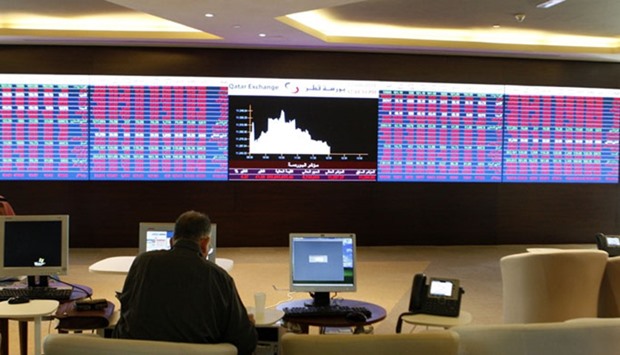The four-month low global oil prices rather limited the FTSE Russell-induced gains on the Qatar Stock Exchange (QSE) this week.
Led by telecom, banking, realty and consumer goods, the 20-stock Qatar Index rose 0.81% this week, which saw Capital Intelligence (CI), a global credit rating agency, affirm QNB’s long and short-term foreign currency ratings at ‘AA-’ and ‘A1+’ respectively.
Kuwait, Abu Dhabi and Bahrain bourses added 3.42%, 1.59% and 0.07%; while Dubai, Saudi Arabia and Muscat fell 1.7%, 0.62% and 0.59% respectively this week which also saw CI affirm Doha Bank’s financial strength rating at ‘A’ with "stable" outlook.
The QSE was up mere 0.08% year-to-date against 22.54% in Kuwait and 12.71% in Bahrain; but Saudi Arabia, Muscat, Dubai and Abu Dhabi reported losses of 4.5%, 2.55%, 1.97% and 1.12% respectively.
Higher demand for mid and large cap equities kept up the rally this week which witnessed Qatar General Insurance and Reinsurance Company (QGIRC) to strengthen its core business on higher demand, especially for large infrastructure projects, and focus more on realty.
Islamic stocks outperformed the market indices this week which saw Mannai Corporation assert that the acquisition of French GFI Informatique helped boost its earnings in 2016.
Net selling by foreign institutions and local retail investors weakened and non-Qatari individuals turned bullish, while foreign institutions’ buying support fell this week which saw Ezdan Holding Group disclose its $2bn sukuk issuance.
Overall trade turnover and volumes shrank this week which saw banking and real estate sectors together account for more than 65% of the volumes.
In volumes, banks and financial services constituted 42% of the total, realty (23%), telecom (18%), industrials (8%), transport (5%), and consumer goods and insurance (2% each) this week which saw Moody's view that stronger margins and resilient cost of risk to help the profitability of Gulf Islamic banks outpace that of their conventional peers this year.
In value, banks and financial services’ share was 51%, real estate and industrials (14% each), telecom (8%), transport (6%), consumer goods (4%) and insurance (3%) this week which saw a Kamco say that the near-term direction of petrodollars in the Gulf is set to become more relevant than the interest rates.
Opening the week weak at 10,339 points, the market then gained for the next two days to reach a high of 10,486 points on FTSE Russell completing the second tranche of local stocks’ upgrade to secondary emerging market index. However, oil prices, which trended to $50 a barrel on Wednesday, led to profit booking but the QSE saw gains on the last day to make the benchmark settle 84 points higher overall this week.
The 20-stock Total Return Index and All Share Index All Share Index (comprising wider constituents) gained 0.99% each, and Al Rayan Islamic Index rose higher by 1.02% this week which saw no trading in treasury bills and government bonds.
The telecom index soared 3.72%, banks and financial services (1.79%), realty (1.73%), consumer goods (1.5%) and transport (0.61%); whereas insurance and industrials shrank 3.3% and 0.45% respectively this week which saw Masraf Al Rayan, Barwa and QIIB dominate the trading ring in volumes and value.
Market capitalisation expanded 0.61% or more than QR3bn to QR559.56bn as mid, large and microcap equities gained 1.1%, 0.87% and 0.53% respectively, while small caps declined 1.83% this week.
Small and microcap scrips have reported year-to-date gains of 2.75% and 0.29%; whereas mid and large caps fell 6.28% and 0.06% respectively.
More than 59% of the stocks gained with major movers being Commercial Bank, Masraf Al Rayan, Mazaya Qatar, Woqod, Qatar National Cement, Mesaieed Petrochemical Holding, Ezdan, Barwa, Ooredoo, Gulf Warehousing and Milaha this week.
Nevertheless, among the losers were Industries Qatar, Aamal Company, Qatar Electricity and Water, Qatar Insurance, QGIRC, Qatar Islamic Insurance, Vodafone Qatar and QIIB this week.
Domestic institutions’ net profit booking weakened considerably to QR414.95mn against QR676.21mn the week ended March 16.
Local retail investors’ net selling fell substantially to QR89.07mn compared to QR195.04mn the previous week.
However, foreign institutions’ net buying declined to QR501.31mn against QR871.25mn the week ended March 16.
Non-Qatari individual investors were net buyers to the tune of QR2.72mn this week.
Total trade volume fell 51% to 50.7mn shares, value by 58% to QR1.81bn and transactions by 37% to 19,951 this week.
There was 73% plunge in the insurance sector’s trade volume to 0.82mn equities, 78% in value to QR48.6mn and 54% in deals to 493.
The consumer goods sector’s trade volume plummeted 71% to 0.94mn stocks, value by 73% to QR76.28mn and transactions by 58% to 1,483.
The industrials sector reported 69% shrinkage in trade volume to 4.02mn shares, 69% in value to QR248.32mn and 39% in deals to 3,620.
The transport sector’s trade volume tanked 66% to 2.64mn equities, value by 59% to QR109.1mn and transactions by 17% to 1,508.
The market witnessed 46% decline in the real estate sector’s trade volume to 11.53mn stocks, 45% in value to QR260.13mn and 28% in deals to 3,428.
The banks and financial services sector’s trade volume shrank 44% to 21.49mn shares, value by 51% to QR917.54mn and transactions by 37% to 7,484.
The telecom sector saw 41% decline in trade volume to 9.26mn equities, 59% in value to QR150.46mn and 27% in deals to 1,935.
Kuwait, Abu Dhabi and Bahrain bourses added 3.42%, 1.59% and 0.07%; while Dubai, Saudi Arabia and Muscat fell 1.7%, 0.62% and 0.59% respectively this week which also saw CI affirm Doha Bank’s financial strength rating at ‘A’ with "stable" outlook.
The QSE was up mere 0.08% year-to-date against 22.54% in Kuwait and 12.71% in Bahrain; but Saudi Arabia, Muscat, Dubai and Abu Dhabi reported losses of 4.5%, 2.55%, 1.97% and 1.12% respectively.
Higher demand for mid and large cap equities kept up the rally this week which witnessed Qatar General Insurance and Reinsurance Company (QGIRC) to strengthen its core business on higher demand, especially for large infrastructure projects, and focus more on realty.
Islamic stocks outperformed the market indices this week which saw Mannai Corporation assert that the acquisition of French GFI Informatique helped boost its earnings in 2016.
Net selling by foreign institutions and local retail investors weakened and non-Qatari individuals turned bullish, while foreign institutions’ buying support fell this week which saw Ezdan Holding Group disclose its $2bn sukuk issuance.
Overall trade turnover and volumes shrank this week which saw banking and real estate sectors together account for more than 65% of the volumes.
In volumes, banks and financial services constituted 42% of the total, realty (23%), telecom (18%), industrials (8%), transport (5%), and consumer goods and insurance (2% each) this week which saw Moody's view that stronger margins and resilient cost of risk to help the profitability of Gulf Islamic banks outpace that of their conventional peers this year.
In value, banks and financial services’ share was 51%, real estate and industrials (14% each), telecom (8%), transport (6%), consumer goods (4%) and insurance (3%) this week which saw a Kamco say that the near-term direction of petrodollars in the Gulf is set to become more relevant than the interest rates.
Opening the week weak at 10,339 points, the market then gained for the next two days to reach a high of 10,486 points on FTSE Russell completing the second tranche of local stocks’ upgrade to secondary emerging market index. However, oil prices, which trended to $50 a barrel on Wednesday, led to profit booking but the QSE saw gains on the last day to make the benchmark settle 84 points higher overall this week.
The 20-stock Total Return Index and All Share Index All Share Index (comprising wider constituents) gained 0.99% each, and Al Rayan Islamic Index rose higher by 1.02% this week which saw no trading in treasury bills and government bonds.
The telecom index soared 3.72%, banks and financial services (1.79%), realty (1.73%), consumer goods (1.5%) and transport (0.61%); whereas insurance and industrials shrank 3.3% and 0.45% respectively this week which saw Masraf Al Rayan, Barwa and QIIB dominate the trading ring in volumes and value.
Market capitalisation expanded 0.61% or more than QR3bn to QR559.56bn as mid, large and microcap equities gained 1.1%, 0.87% and 0.53% respectively, while small caps declined 1.83% this week.
Small and microcap scrips have reported year-to-date gains of 2.75% and 0.29%; whereas mid and large caps fell 6.28% and 0.06% respectively.
More than 59% of the stocks gained with major movers being Commercial Bank, Masraf Al Rayan, Mazaya Qatar, Woqod, Qatar National Cement, Mesaieed Petrochemical Holding, Ezdan, Barwa, Ooredoo, Gulf Warehousing and Milaha this week.
Nevertheless, among the losers were Industries Qatar, Aamal Company, Qatar Electricity and Water, Qatar Insurance, QGIRC, Qatar Islamic Insurance, Vodafone Qatar and QIIB this week.
Domestic institutions’ net profit booking weakened considerably to QR414.95mn against QR676.21mn the week ended March 16.
Local retail investors’ net selling fell substantially to QR89.07mn compared to QR195.04mn the previous week.
However, foreign institutions’ net buying declined to QR501.31mn against QR871.25mn the week ended March 16.
Non-Qatari individual investors were net buyers to the tune of QR2.72mn this week.
Total trade volume fell 51% to 50.7mn shares, value by 58% to QR1.81bn and transactions by 37% to 19,951 this week.
There was 73% plunge in the insurance sector’s trade volume to 0.82mn equities, 78% in value to QR48.6mn and 54% in deals to 493.
The consumer goods sector’s trade volume plummeted 71% to 0.94mn stocks, value by 73% to QR76.28mn and transactions by 58% to 1,483.
The industrials sector reported 69% shrinkage in trade volume to 4.02mn shares, 69% in value to QR248.32mn and 39% in deals to 3,620.
The transport sector’s trade volume tanked 66% to 2.64mn equities, value by 59% to QR109.1mn and transactions by 17% to 1,508.
The market witnessed 46% decline in the real estate sector’s trade volume to 11.53mn stocks, 45% in value to QR260.13mn and 28% in deals to 3,428.
The banks and financial services sector’s trade volume shrank 44% to 21.49mn shares, value by 51% to QR917.54mn and transactions by 37% to 7,484.
The telecom sector saw 41% decline in trade volume to 9.26mn equities, 59% in value to QR150.46mn and 27% in deals to 1,935.




